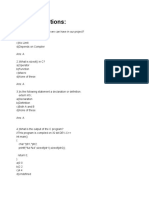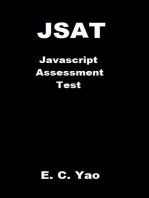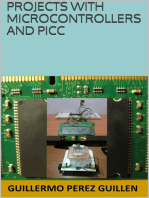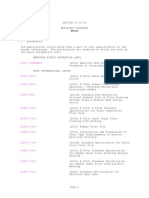1
1
Uploaded by
Sourabh BhavsarCopyright:
Available Formats
1
1
Uploaded by
Sourabh BhavsarOriginal Title
Copyright
Available Formats
Share this document
Did you find this document useful?
Is this content inappropriate?
Copyright:
Available Formats
1
1
Uploaded by
Sourabh BhavsarCopyright:
Available Formats
1) #include<stdio.
h> int main(){ int a=2; if(a==2){ a=~a+2<<1; printf("%d",a); } else{ break; } return 0;
} ANS: (A) It will print nothing. (B) -3 (C) -2 (D) 1 (E) Compiler error ANS(Break is not part of if)
2) #include<stdio.h>
int main(){ char c=125; c=c+10; printf("%d",c); return 0;
(A) 135 (B) +INF (C) -121( CORRECT ANS) (D) -8 (E) Compiler error
3)
A binary tree having 20 nodes have hw many null branches?. ANS 21
4) void main() { while(1){ if(printf(%d,printf(%d))) break; else continue; }
Answer: Garbage values Explanation: The inner printf executes first to print some garbage value. The printf returns no of characters printed and this value also cannot be predicted. Still the outer printf prints something and so returns a non-zero value. So it encounters the break statement and comes out of the while statement.
5)
Tiem complexict in inerting element in queue A binary tree with n nodes has exactly n+1 null nodes.
6) What is the output of the following code? #include void main() { int s=0; while(s++<10)> # define a 10 main() { printf("%d..",a); foo(); printf("%d",a); } void foo()
{ #undef a #define a 50 }
1) 10..10 2) 10..50 3) Error (CORRECT ANS) chekc once again 4) 0
7) #include void func() { int x = 0; static int y = 0; x++; y++; printf( "%d -- %d\n", x, y ); }
int main() { func(); func(); return 0;
What will the code above print when it is executed? 1) 1 -- 1 1 -- 1 2) 1 -- 1 2 -- 1 3) 1 -- 1 2 -- 2 4)CORRECT ANS (1..1,1..2) 1 -- 1 1 -- 2
8) Code:
struct node *nPtr, *sPtr; /* pointers for a linked list. */ for (nPtr=sPtr; nPtr; nPtr=nPtr->next) { free(nPtr);
The sample code above releases memory from a linked list. Which of the choices below accurately describes how it will work? Choice 1 It will work correctly since the for loop covers the entire list. Choice 2 It may fail since each node "nPtr" is freed before its next address can be accessed. (CORRECT ANS) Choice 3 In the for loop, the assignment "nPtr=nPtr->next" should be changed to "nPtr=nPtr.next". Choice 4 This is invalid syntax for freeing memory. Choice 5 The loop will never end. ------------------
9)
penny = one nickel = five dime = ten quarter = twenty-five How is enum used to define the values of the American coins listed above? Choice 1 enum coin {(penny,1), (nickel,5), (dime,10), (quarter,25)}; Choice 2 enum coin ({penny,1}, {nickel,5}, {dime,10}, {quarter,25});
Choice 3 enum coin {penny=1,nickel=5,dime=10,quarter=25};[Ans] Choice 4 enum coin (penny=1,nickel=5,dime=10,quarter=25); Choice 5 enum coin {penny, nickel, dime, quarter} (1, 5, 10, 25);
10)
Code:
int i = 4; int x = 6; double z; z = x / i; printf("z=%.2f\n", z);
What will print when the sample code above is executed? Choice 1 z=0.00 Choice 2 z=1.00[Ans] Choice 3 z=1.50
Choice 4 z=2.00 Choice 5 z=NULL
11) Code:
int fibonacci (int n) { switch (n) { default: return (fibonacci(n - 1) + fibonacci(n - 2)); case 1: case 2: } return 1; }
The function above has a flaw that may result in a serious error during some invocations. Which one of the following describes the deficiency illustrated above? Choice 1 For some values of n, the environment will almost certainly exhaust its stack space before the calculation completes.(CORRECT ANS) Choice 2
An error in the algorithm causes unbounded recursion for all values of n. Choice 3 A break statement should be inserted after each case. Fall-through is not desirable here. Choice 4 The fibonacci() function includes calls to itself. This is not directly supported by Standard C due to its unreliability. Choice 5 Since the default case is given first, it will be executed before any case matching n.
12)
What is the output of this program?
Void main() { char thought[2][30]={"Don`t walk in front of me..","I am not follow"}; printf("%c%c",*(thought[0]+9),*(*(thought+0)+5)); }
kk Don`t walk in front of me I may not follow K[ANS]
13) (1) What will be output if you will compile and execute the following c code? (refernce:http://cquestionbank.blogspot.in/2012/02/tricky-c-questions-and-answers.html)
struct marks{
int p:3; int c:3; int m:2; }; void main(){ struct marks s={2,-6,5}; printf("%d %d %d",s.p,s.c,s.m); }
(a) 2 -6 5 (b) 2 -6 1 (c) 2 2 1 (d) Compiler error (e) None of these
Answer: (c) Explanation: Binary value of 2: 00000010 (Select three two bit) Binary value of 6: 00000110 Binary value of -6: 11111001+1=11111010 (Select last three bit) Binary value of 5: 00000101 (Select last two bit)
Complete memory representation:
14)
What will be output if you will compile and execute the following c code?
void main(){ printf("%s","c" "question" "bank"); }
(a) c question bank (b) c (c) bank (d) cquestionbank (e) Compiler error
Answer: (d) Explanation: In c string constant xy is same as x y
15) What will be output if you will compile and execute the following c code?
void main(){ int a=25; clrscr(); printf("%o %x",a,a); getch();
(a) 25 25 (b) 025 0x25 (c) 12 42 (d) 31 19 (e) None of these
Answer: (d) Explanation: %o is used to print the number in octal number format. %x is used to print the number in hexadecimal number format. Note: In c octal number starts with 0 and hexadecimal number starts with 0x.
16) What is error in following declaration?
struct outer{ int a; struct inner{ char c; }; };
(A)
Nesting of structure is not allowed in c.
(B) It is necessary to initialize the member variable. (C) (D) (E) Inner structure must have name. Outer structure must have name. There is not any error.
Explanation: It is necessary to assign name of inner structure at the time of declaration other wise we cannot access the member of inner structure. So correct declaration is: struct outer{ int a; struct inner{ char c; }name; };
17) What will be output of the following c program?
#include<stdio.h> int main(){ int _=5; int __=10; int ___; ___=_+__;
printf("%i",___); return 0; }
(A) (B) (C) (D) (E)
5 10 15 Compilation error None of these
Explanation: (C) 15 Variable name can have only underscore.
18) What will be output of the following c program?
#include<stdio.h> int main(){ int ABC=10; printf("%d",abc); return 0; }
(A)
10
(B) (C) (D) (E)
0 5 Compilation error None of these
Explanation: (D) Compilation error Variable name is case sensitive.
19)
What will be output of following c code?
#include<stdio.h> extern int x; int main(){ do{ do{ printf("%o",x); } while(!-2); } while(0); return 0; } int x=8;
Explanation
Output: 10 Explanation: Here variable x is extern type. So it will search the definition of variable x. which is present at the end of the code. So value of variable x =8 There are two do-while loops in the above code. AS we know do-while executes at least one time even that condition is false. So program control will reach at printf statement at it will print octal number 10 which is equal to decimal number 8. Note: %o is used to print the number in octal format. In inner do- while loop while condition is ! -2 = 0 In C zero means false. Hence program control will come out of the inner dowhile loop. In outer do-while loop while condition is 0. That is again false. So program control will also come out of the outer do-while loop.
20) What will be output if you will execute following c code?
#include<stdio.h> #include<conio.h> void main(){ int i=3,val; val=sizeof f(i)+ +f(i=1)+ +f(i-1); printf("%d %d",val,i);
} int f(int num){ return num*5; }
(A) (B) (C) (D) (E)
20 71 17 0 21 Compilation error
Correct answer is :(B) Runniing Prog in Dev C gives
91
21) What will be output if you will execute following c code?
#include<stdio.h> #include<conio.h> void main(){ int i=3,val; val=sizeof (f(i)+ +f(i=1)+ +f(i-1)); printf("%d %d",val,i); } int f(int num){ return num*5;
} (A)2 3 (B)4 3 (C)3 2 (D)Compilation error
Correct answer is :(B) 4 3 Explanation: Turbo C 3.0 and Turbo C 4.5 compiler: 23 Linux GCC complier 43 Any expression inside sizeof operator is never changed the value of the any variable. So value of variable i will remain 3. After the evaluation of expression inside sizeof operator we will get an integer value. So value of variable val will be sizeof int data type.
Note: Size of into in turbo C 3.0 and 4.5 is two byte while Linux gcc complier is four byte
22)
What will be output of following c program?
#include "string.h" typedef struct stu1{ char name1[6]; char name2[6]; double marks; }STU1;
void main(){ STU1 s1={"rohit","kumar",87.43},*p1; char *p; p1=&s1; p=memchr(p1,'u',sizeof(STU1)); printf("%s",p); } (A) (B) (C) (D) (E) r rohit umar rohit kumar Compilation error
ANS:- (C) umar
23)
What will be output of following c program?
#include<stdio.h> int main(){ float x; x=(int)1.1,(float)2.2,(int)3.3 ,5.4; printf("%f",x);
return 0; }
(A) (B) (C) (D) (E)
1.000000 5.400000 2.200000 3.300000 Compilation error
ANS:-(A) 1.000000
24) What will be output of following c program?
#include<stdio.h> #include<conio.h> float avg(float,float,float); void main(){ float p=1,q=2,r=-2,a; a=avg(p,(q=4,r=-12,q),r); printf("%f",a); } float avg(float x,float y,float z){ return (x+y+z)/3; }
(A) (B) (C) (D) (E)
0.111111 1.000000 -0.777777 -1.000000 Compilation error
ANS:- (B)
1.000000
25) What will be output of following c program?
#include<stdio.h> #include<conio.h> void main(){ int i=3,val; val=f(i)+ +f(i=1)+ +f(i-1); printf("%d",val); } int f(int num){ return num*5; } (A) (B) (C) (D) 30 20 21 31
(E)
Compilation error
ANS:- (B)
20
26) What will be output of following c program?
#include<stdio.h> int main(){ int a=5; static int b=a; printf("%d %d",a,b); return 0; } (A) (B) (C) (D) (E) 5 5 5 0 5 null 5 Garbage Compilation error
ANS:- (E)
Compilation error
27)
Miscellaneous
1) What will be output if you will compile and execute the following c code?
int extern x; void main() printf("%d",x); x=2; getch(); } int x=23;
(a) 0 (b) 2 (c) 23 (d) Compiler error (e) None of these
Answer: (c) Explanation: extern variables can search the declaration of variable any where in the program.
2) What will be output if you will compile and execute the following c code?
void main(){ int i=10; static int x=i; if(x==i) printf("Equal"); else if(x>i) printf("Greater than"); else printf("Less than"); }
(A) (B) (C) (D) (E)
Equal Greater than Less than Compiler error None of above
Explanation: static variables are load time entity while auto variables are run time entity. We can not initialize any load time variable by the run time variable. In this example i is run time variable while x is load time variable.
------------------------------------------------------------------------------------------
Static functions in C May 5, 2010
In C, functions are global by default. The static keyword before a function name makes it static. For example, below function fun() is static. static int fun(void) { printf("I am a static function "); }
Unlike global functions in C, access to static functions is restricted to the file where they are declared. Therefore, when we want to restrict access to functions, we make them static. Another reason for making functions static can be reuse of the same function name in other files.
For example, if we store following program in one file file1.c /* Inside file1.c */ static void fun1(void) { puts("fun1 called"); }
And store following program in another file file2.c /* Iinside file2.c */ int main(void) { fun1();
getchar(); return 0; }
Now, if we compile the above code with command gcc file2.c file1.c, we get the error undefined reference to `fun1' . This is because fun1() is declared static in file1.c and cannot be used in file2.c.
Please write comments if you find anything incorrect in the above article, or want to share more information about static functions in C.
------------------------------------------------------------------------------------------------------------------------------------------
What is the purpose of a function prototype? August 12, 2009
The Function prototype serves the following purposes -
1) It tells the return type of the data that the function will return. 2) It tells the number of arguments passed to the function. 3) It tells the data types of the each of the passed arguments. 4) Also it tells the order in which the arguments are passed to the function.
Therefore essentially, function prototype specifies the input/output interlace to the function i.e. what to give to the function and what to expect from the function.
Prototype of a function is also called signature of the function.
What if one doesnt specify the function prototype? Output of below kind of programs is generally asked at many places. int main() { foo(); getchar(); return 0; } void foo() { printf("foo called"); }
If one doesnt specify the function prototype, the behavior is specific to C standard (either C90 or C99) that the compilers implement. Up to C90 standard, C compilers assumed the return type of the omitted function prototype as int. And this assumption at compiler side may lead to unspecified program behavior.
Later C99 standard specified that compilers can no longer assume return type as int. Therefore, C99 became more restrict in type checking of function prototype. But to make C99 standard backward compatible, in practice, compilers throw the warning saying that the return type is assumed as int. But they go ahead with compilation. Thus, it becomes the responsibility of programmers to make sure that the assumed function prototype and the actual function type matches.
To avoid all this implementation specifics of C standards, it is best to have function prototype
You might also like
- All New Classic 350 Service Manual Euro VDocument1,213 pagesAll New Classic 350 Service Manual Euro VItalo Marinho100% (1)
- CA VD4-50kA (EN) W 1VCP000001 10.2017-DigiPrintDocument122 pagesCA VD4-50kA (EN) W 1VCP000001 10.2017-DigiPrintTukaram PawarNo ratings yet
- C QuestionsDocument34 pagesC QuestionsabhiramNo ratings yet
- C Questions and AnswersDocument29 pagesC Questions and AnswersPunitNo ratings yet
- Tricky C QuestionsDocument24 pagesTricky C QuestionshonalemangeshNo ratings yet
- C ObjectiveDocument57 pagesC ObjectiveSri PrashanthiNo ratings yet
- C & C++Document11 pagesC & C++AbhiNo ratings yet
- C With ProgramsDocument21 pagesC With ProgramsNandha Kumar0% (1)
- C Quiz Questions With AnswersDocument22 pagesC Quiz Questions With AnswersvanithaarivuNo ratings yet
- C Language Quiz Questions and Answers With ExplanationDocument47 pagesC Language Quiz Questions and Answers With ExplanationarunNo ratings yet
- C Ques1Document45 pagesC Ques1Prashant ChaurasiaNo ratings yet
- Programming MethodologyDocument6 pagesProgramming MethodologyRohit JoshiNo ratings yet
- C KandarDocument8 pagesC KandarGaurav PatilNo ratings yet
- C Faq3Document83 pagesC Faq3ShaaahidNo ratings yet
- C Language Questions and Answers PDFDocument18 pagesC Language Questions and Answers PDFvamss89% (9)
- Quiz 1Document12 pagesQuiz 1spmeceNo ratings yet
- Coding and Debugging 2nd RoundDocument5 pagesCoding and Debugging 2nd RoundReddy theja KNo ratings yet
- Expressions-Objective Type Q & ADocument18 pagesExpressions-Objective Type Q & Akalaivani0% (1)
- C Programming QuestionDocument12 pagesC Programming Questionmkpooja1622No ratings yet
- Updated Quiz1 CDocument9 pagesUpdated Quiz1 Cprince SinghNo ratings yet
- C ProgrammingDocument186 pagesC ProgrammingSourish SarkarNo ratings yet
- Void Int Float Sizeof: Main (A 5 B Printf (, (++a+b) ) Printf (,a) ) (A) 2 6 (B) 4 6 (C) 2 5 (D) 4 5 (E) Compiler ErrorDocument24 pagesVoid Int Float Sizeof: Main (A 5 B Printf (, (++a+b) ) Printf (,a) ) (A) 2 6 (B) 4 6 (C) 2 5 (D) 4 5 (E) Compiler ErrorangelkritikaNo ratings yet
- Section I: Objective: 1. How Many X's Are Printed?Document6 pagesSection I: Objective: 1. How Many X's Are Printed?SreeSureshNo ratings yet
- C, C++ QuestionsDocument39 pagesC, C++ QuestionsSundaram MarimuthuNo ratings yet
- C Programming MCQDocument50 pagesC Programming MCQDurga ShivNo ratings yet
- HCL Technical MCQ - 239 QuestionsDocument66 pagesHCL Technical MCQ - 239 QuestionsAbdul MusavvirNo ratings yet
- Computer Technical QuestionsDocument13 pagesComputer Technical QuestionsShyam VermaNo ratings yet
- CDocument32 pagesCAniket ShirkeNo ratings yet
- C PuzzlesDocument20 pagesC Puzzlesapi-3721375100% (1)
- MCQ'sDocument10 pagesMCQ'ssjprabakarsathyNo ratings yet
- Lines Which Gives Description of What Is Written in Code (Something Like This) ... Answer Is: - CommentsDocument15 pagesLines Which Gives Description of What Is Written in Code (Something Like This) ... Answer Is: - CommentsVineet RanjanNo ratings yet
- C C++ TcsDocument8 pagesC C++ TcschinnuNo ratings yet
- CsolutinDocument31 pagesCsolutinAnurag GoelNo ratings yet
- 5 8 2024-GateDocument21 pages5 8 2024-GateMohana MNo ratings yet
- C Question and AnswerrDocument130 pagesC Question and Answerrreeyanatirkey89% (9)
- C Language Quiz QuestionsDocument23 pagesC Language Quiz Questionsanon_368120202No ratings yet
- FDS MCQ Question Bank Unit 1 To 4Document15 pagesFDS MCQ Question Bank Unit 1 To 4Ufyfivig100% (3)
- C ProgrammingDocument19 pagesC ProgrammingBalaji MehtaNo ratings yet
- Total C Prog BitsDocument77 pagesTotal C Prog BitsKurumeti Naga Surya Lakshmana KumarNo ratings yet
- C Questions PDFDocument111 pagesC Questions PDFSarwar Pasha MohammedNo ratings yet
- FinalCElec Tec AnsDocument7 pagesFinalCElec Tec Ansmohammad.khalifa3o58No ratings yet
- PPS All Units 2 MarksQuestions With AnswersDocument33 pagesPPS All Units 2 MarksQuestions With AnswersHARIKRISHNA SATVIKNo ratings yet
- Wipro 5Document183 pagesWipro 5SanthoshiniRajanNo ratings yet
- 300+ REAL TIME C Language Objective Questions & AnswersDocument31 pages300+ REAL TIME C Language Objective Questions & AnswersBrc DharampurNo ratings yet
- Fds Se Comp TechvinesDocument196 pagesFds Se Comp TechvinesAakanksha BarakadeNo ratings yet
- C MCQ Catest1Document11 pagesC MCQ Catest1Syed AkramNo ratings yet
- Global Edge C ProgramDocument14 pagesGlobal Edge C ProgramAbhishek Ek100% (1)
- DhanwinDocument13 pagesDhanwinPRO DHANWINNo ratings yet
- C ProgDocument4 pagesC ProgMonisha Vishwanath100% (1)
- FinalElex Tec AnsDocument8 pagesFinalElex Tec Ansmohammad.khalifa3o58No ratings yet
- Cdac Sample PaperDocument22 pagesCdac Sample PaperPavan KumarNo ratings yet
- The Elements of Computing Systems, second edition: Building a Modern Computer from First PrinciplesFrom EverandThe Elements of Computing Systems, second edition: Building a Modern Computer from First PrinciplesNo ratings yet
- Projects With Microcontrollers And PICCFrom EverandProjects With Microcontrollers And PICCRating: 5 out of 5 stars5/5 (1)
- UNIX Shell Programming Interview Questions You'll Most Likely Be AskedFrom EverandUNIX Shell Programming Interview Questions You'll Most Likely Be AskedNo ratings yet
- Information Assets Security Classification PolicyDocument5 pagesInformation Assets Security Classification PolicyGilga RamsNo ratings yet
- IVECO CatalogueDocument60 pagesIVECO Cataloguesukul100% (3)
- Apr 308/338 - Sniper Rifle .308 WIN/.338 LAPUA MAGNUM: Accessories APR308 Technical Specifications APR308 APR338Document2 pagesApr 308/338 - Sniper Rifle .308 WIN/.338 LAPUA MAGNUM: Accessories APR308 Technical Specifications APR308 APR338Razza Willi50% (2)
- 1521 PS 0008 GS4 GS6 Manual Issue 3Document25 pages1521 PS 0008 GS4 GS6 Manual Issue 3olumideNo ratings yet
- Magnetic Flow Meter 1 - 6f9aDocument16 pagesMagnetic Flow Meter 1 - 6f9aSilvaACANo ratings yet
- T Rec G.652 200911 S!!PDF eDocument22 pagesT Rec G.652 200911 S!!PDF eDania Sartika AnggraeniNo ratings yet
- QoS For VOIP On Dell N-Series and W-SeriesDocument33 pagesQoS For VOIP On Dell N-Series and W-Seriescesarina138065No ratings yet
- Ubiquiti Air Fiber Af24Document4 pagesUbiquiti Air Fiber Af24Carlos RodriguezNo ratings yet
- Ammunition MarkingDocument15 pagesAmmunition MarkingEmmanuel RodriguezNo ratings yet
- Excel BassicDocument15 pagesExcel BassicAnonymous lq9HlZ0kNo ratings yet
- Bosch Releaseletter ConfigManager 6.20.0102Document15 pagesBosch Releaseletter ConfigManager 6.20.0102Fabian Andres Diaz Malpik100% (1)
- Invitation English XIDocument4 pagesInvitation English XIFinandyaNo ratings yet
- Syed Mustafa CVDocument2 pagesSyed Mustafa CVsaif syedNo ratings yet
- Chapter 4 - Material ManagementDocument15 pagesChapter 4 - Material ManagementRohit BadgujarNo ratings yet
- Gorenje Simplicity Catalogue 2013Document40 pagesGorenje Simplicity Catalogue 2013monacosloNo ratings yet
- Assign 1Document5 pagesAssign 1Aubrey Camille Cabrera100% (1)
- 09 65 00 - DraftDocument14 pages09 65 00 - DraftRodolfo CastilloNo ratings yet
- Tririga SsoDocument26 pagesTririga Ssojulian100% (1)
- Presentation 6 S STARTER TrainingDocument96 pagesPresentation 6 S STARTER Trainingm_ramas2001No ratings yet
- HSE-P-16 HSE Communications Procedure Issue 1.1Document3 pagesHSE-P-16 HSE Communications Procedure Issue 1.1eng20072007100% (1)
- British StandardsDocument12 pagesBritish Standardsniginp67% (3)
- FISHINGDocument112 pagesFISHINGbojana vascicNo ratings yet
- ASCO Miniature Valve Products (AV017R5)Document96 pagesASCO Miniature Valve Products (AV017R5)vasudeva yasasNo ratings yet
- D 0000 Is Ett 00002 - 0Document16 pagesD 0000 Is Ett 00002 - 0Arnold Vasquez SalirrosasNo ratings yet
- An Overview of Controller Area Network (CAN) Technology: November 12, 2003Document20 pagesAn Overview of Controller Area Network (CAN) Technology: November 12, 2003Dilyan MarinoffNo ratings yet
- High Voltage FuseseDocument28 pagesHigh Voltage Fusesezbyszko201234No ratings yet
- Home Master s6 - User GuideDocument12 pagesHome Master s6 - User GuideImran RathoreNo ratings yet
- Wind Loads Per ASCE 7-98 or 1997 UBC 2Document13 pagesWind Loads Per ASCE 7-98 or 1997 UBC 2dksheaNo ratings yet

























































































